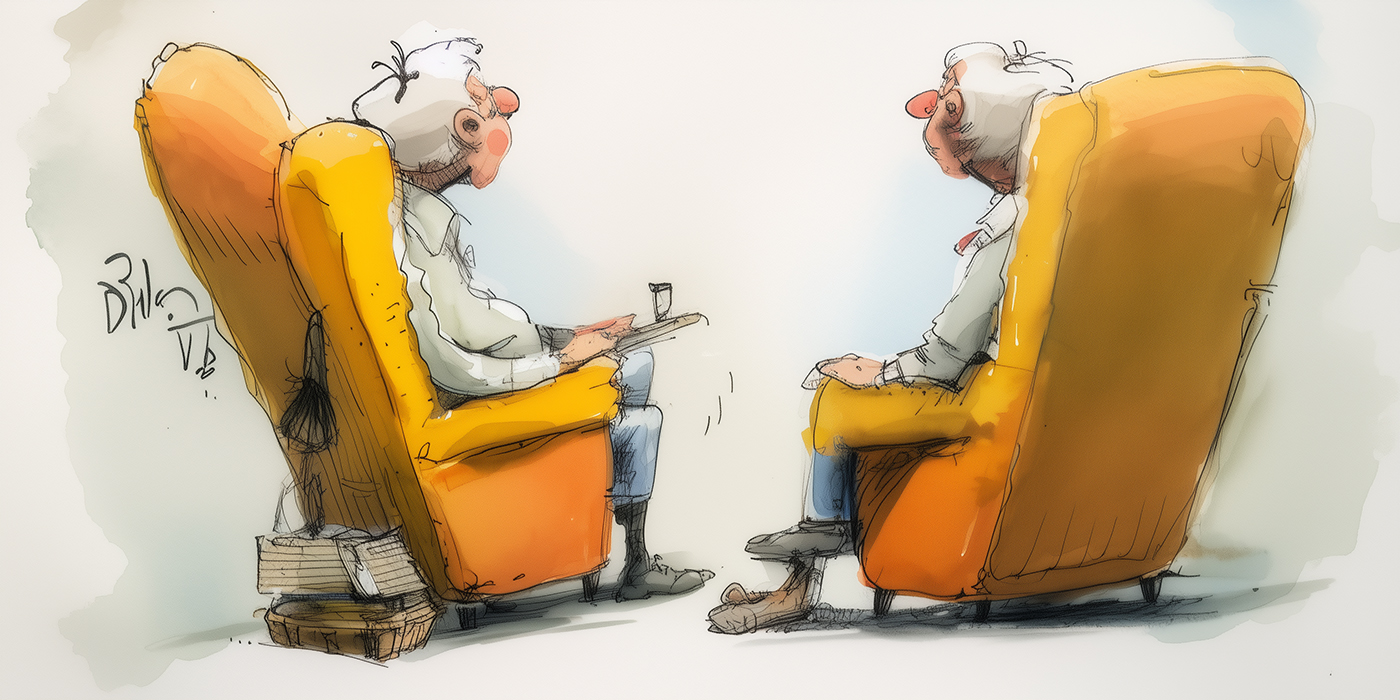Recently, I celebrated one year of SA sobriety—after more than 11 years in this program. I turned 62 last week, and I’m still married after 36 years. But today, when I reflect on my powerlessness and the unmanageability of my life over the past 50 years, I can see that my own efforts to stay sober have been doomed to failure. Today I know that my only hope is to rely on God to work this program and to give me the grace to stay sober.
Most of my life I have felt that I was close to God. So each time I acted out, I would feel tremendous shame, ask God for forgiveness, and make solemn promises to stop. But I was unable to keep my promises.
During high school and college, I was shy and never dated much. To cover up my feelings of inadequacy, I visited adult book stores and masturbated to pornographic movies. After college, I got a job as a computer programmer, and I visited the local strip clubs after work. I also joined my church’s adult singles group, where I met my future wife. We never had actual intercourse before marriage, but it was exciting for me to be sexually intimate with a woman rather than living vicariously with pornography or strip clubs.
During the “honeymoon phase” of our marriage we were blessed with three wonderful children. The responsibilities associated with my new family and job kept me busy, and I don’t remember acting out during the first 10 years of marriage.
But my dormant disease eventually became active. We moved to a new city, where I worked as a high school teacher. I remember working very late one night preparing students’ final grades. This was quite stressful, and to relieve the stress, I visited a strip club afterwards. Then I returned home and snuck into bed.
When I was 40, I switched jobs and got back into the computer industry. I was making more money and had more unaccountable time. I would act out during my lunch hours at strip clubs and bookstores. Eventually progressed to massage parlors and then Internet pornography.
To finance my habit, I took money out of the ATM, went without lunch, and spent as little as possible on other things. Sometimes my wife asked me where the money had gone. I would say, “I had to fill up my gas tank,” or “They were collecting money at work,” or some other lie.
Once I hocked my extra wedding ring at a pawnshop so I could act out at an adult bookstore. The ring had been a replacement for my original ring, which I had lost but later found. Today, I see this as a symbol of the depths of my insanity: I traded something that represented our marriage union for a few dollars to act out in a seedy bookstore.
During my 40s, I sought professional help. I went to a psychiatrist who prescribed an anti-depressant to dampen my impulses to act out. This worked phenomenally. I felt liberated! I went to my first SA meeting at the prompting of my counselor. During the orientation and group sharing, I heard my story over and over again. I was a sexaholic! But I didn’t need meetings. I had my drugs.
Then I had to apply for a top-secret clearance at work. I thought the anti-depressant might be detected in the drug test, and I’d be declared crazy. So I stopped taking it for a while. When I later resumed the drug, it didn’t work as well. In fact, my disease got worse. I became more daring, asking for more and more to satisfy my fantasies.
As I approached my 50th birthday and the upcoming renewal of our wedding vows to celebrate our 25th wedding anniversary, I was determined to end my unfaithfulness to my wife. Soon after the renewal of the vows, however, my motivation dwindled, and I slipped back into acting out with a vengeance. My guilt and shame intensified. I felt alienated from God and completely without value.
The acting out culminated one night after I walked out of a massage parlor. As I left, I realized something was different. In the past, after acting out, I would feel guilt and shame, and tell myself I would not do this again. But this time I began to fantasize about what more I could do, and I wanted to return to that massage parlor. It dawned on me that I had no resolve to stop. I had no hope of reconciling what I was doing with my faith in God. I felt doomed to be forever alienated from the God I had known for 50 years.
As I pondered my condition, I decided to go to an SA meeting. I got a sponsor, went to 30 meetings in 30 days, began working the Steps, and was able to stay sober. And if that were the end of my story, today I would be celebrating 11½ years of sobriety. But that was not to be.
During the first three years of my sobriety, I continued to struggle with pornography, but I worked closely with my sponsor and got involved in meetings. I began making amends. I was able, with the support of others, to have the courage to finally tell my wife the exact nature of my harms to her. I felt liberated. My wife knew what I had done, and she decided to stay with me and work on our relationship.
Then my sponsor moved away, and I did not get another one. I thought that after three years of sobriety, it wasn’t necessary. But for me it was always about technical sobriety, not recovery—and I was interpreting the definition of “sex with self” as “masturbating to climax.” My so-called sobriety continued for two more years, while my bouts with pornography, masturbation without climax, and voyeurism continued.
In reality, I was not in recovery and certainly not sober. A member suggested that I was only fooling myself, and after some discussions with him and others, I reluctantly reset my sobriety time from five years to zero. Then, a voice inside me said, “Since you no longer have your precious five years of sobriety, you might as well get the full benefits of having no sobriety and act out all the way.”
This led to six years of painfully intermittent sobriety. I got a new sponsor, but I struggled. I was missing something. I tried to do the right things, but I never felt the urgency of complete commitment to the program, and I did not see any need for recovery along with sobriety.
My acting out intensified. I crossed new boundaries. I was crossing the border to act out in more risky situations. The logistics of financing, time management, and concealment were devouring me.
Then, about a year ago, I received a wake-up call. My older brother was diagnosed with AIDS. He revealed to his wife that he had had sexual relations with someone they both knew. She and their six grown children were devastated. His oldest daughter’s wedding was a month away, and he was in the hospital being treated for AIDS. This caused tremendous stress, bewilderment, anger, and grief in his family. Several of his children shunned him.
My brother’s wife wanted to keep this a secret from the extended family for the sake of her daughter’s wedding, but she reached out to my wife. When my wife heard the news, she began to wonder about me, because she knew of my past activities and some of my current struggles.
My wife started making comments like, “You had better not be doing anything like this.” I told my sponsor that my wife would be demanding answers to her suspicions, and I wasn’t sure what to tell her. My sponsor advised me to be cautious and not just dump everything without considering the consequences. I waited for an appropriate opportunity.
After a couple of weeks of trying to process what was happening in my brother’s marriage and what might be happening in ours, my wife asked me whether I had done anything that she should be concerned about. I prayed for guidance, and God gave me the courage to tell her in general terms what I had done. I told her I was sorry. I said that I had just been tested for STDs and that the tests were negative. She decided to stay.
I know that the process of making amends to my wife will take me the rest of my life and will never be complete. But ever since that day, I have been determined to do all I can to keep myself from falling back into my disease. I went to a psychiatrist and he doubled the dosage of my anti-depressant. This seems to make the lust hits less severe. I told my pastor about my struggles and that I don’t want to be a hypocrite any longer. That conversation has helped me feel more comfortable in my skin. I started calling my sponsor more regularly and began working the Steps again. I volunteered for a service position and have led a couple of topic meetings—two things I had not done for seven years.
Today I know that I’m afflicted with a forgetting disease. Reflecting on my story is helpful because I never want to go back to where I was. Today, after a year of real sobriety plus some work toward recovery, my life is a whole lot better.
Without the clouds of guilt and shame that hung over me when I was acting out, I feel more worthy and able to enjoy the love of friends and family. Life makes more sense. I am much more able to relax when interacting with others. I am more optimistic that my life will continue to get better as I work this program of recovery. I thank God for not giving up on me and for allowing me to regain the life I had lost.
I still get down on myself at times, but overall I have much more peace in my life. I am more accepting of my failures because I see more clearly how powerless I really am. I am more willing to look at my character defects and less fearful of owning them. I have more motivation to work on those aspects of my life that need improvement.
Most of all, I now see clearly how slippery the path of life is, and that helps me to keep in closer communication with God. I have a deeper desire to turn over all aspects of my life—my actions, thoughts, and emotions—to God’s care. Seeing God work in me despite my failures has given me a greater sense of hope.
Today, I know that I need God to give me the grace to work the Steps and maintain a fit spiritual condition. I need to make use of the tools of the program when my lust surfaces. I need to stop trying to control my own life, and allow God to take over. I want to be a better husband, better father, better grandfather, better friend, and better member of SA. These goals seem lofty to me, but I believe in the Promises and I know they will materialize if I work for them.
Anonymous






